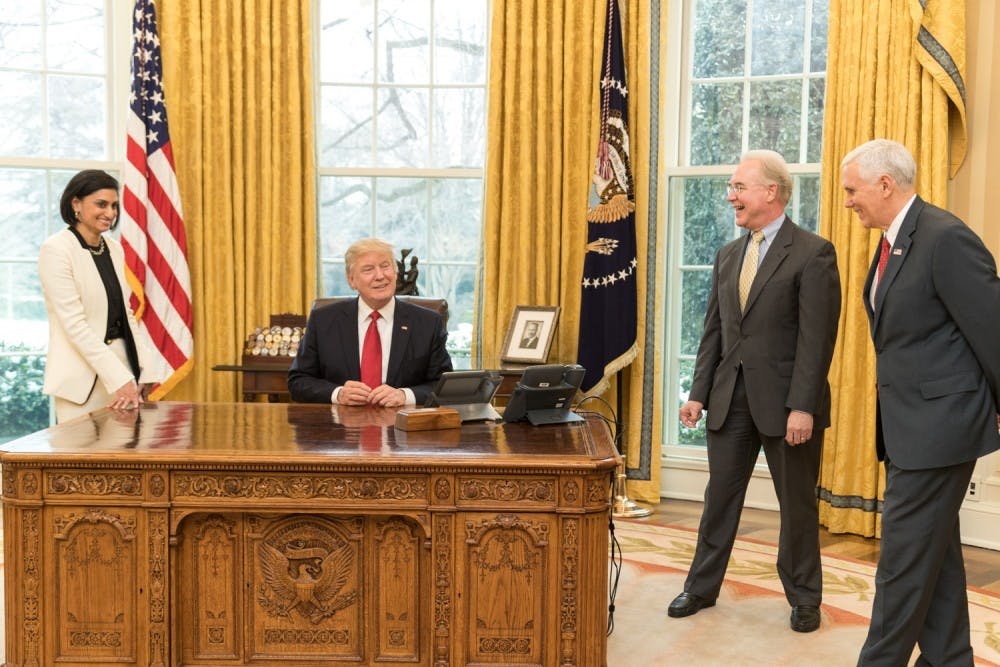Many have argued that President Donald Trump’s vacationing habits help the United States return to a limited form of government. Such a position implies that presidential inaction leads to a reformed, smaller federal government when, in reality, such inaction only perpetuates Washington’s bureaucratic nature. In fact, Trump has intentions to expand the power of the executive branch and the federal government overall.
A major concern of political conservatives is the expansive bureaucracy of the federal government. Conservatives argue that if the federal government limited its size and power by transferring duties to state and local governments, the nation’s overall performance would greatly increase and Congress’ ability to draft impactful legislation would improve. A Gallup poll conducted in September 2017 found that only 16 percent of the American public approves of Congress’ performance. Conservatives see a more limited form of government as an effective remedy to that disdain. Trump recognized the potential benefits of embodying this viewpoint in his campaign.
Trump promised in October 2016 to “drain the swamp.” He argued that Washington’s officials often remain content with high-paying jobs, revolving between positions in Congress, the bureaucracy and lobbying firms. Trump also claimed that his administration would eliminate government gridlock and ensure that Congress was passing legislation, which would have a positive impact on the American public. Specifically, he promised to issue a five-year ban on lobbying immediately after working in the executive branch, which he purported would replace political lethargy with motivation. He also said he would shut down the Environmental Protection Agency, repeal the Affordable Care Act and eliminate a significant portion of the Education Department. Furthermore, Trump campaigned on broad tax cuts and deregulation in an effort to double U.S. economic growth under his administration.
Those proposals, however, face difficult challenges. Gutting the EPA, for example, requires congressional action and the constitutionality of any efforts would be challenged in court. Economic deregulation faces hurdles as well. For example, a proposed dismantling of the Dodd-Frank Wall Street Reform and Protection Law would require congressional support as well. Whether Trump’s supporters recognized these hurdles or not, such policies seemed promising. They believe that Trump’s plan to “drain the swamp” could effectively loosen the gridlock in Washington and enable Congress to better perform its duties.
Instead of draining, the swamp has only grown over the last year. In a scandal emblematic of Trump’s embrace of the swamp, his health and human services secretary Tom Price resigned on Sept. 29 amid reports that he had spent over $400,000 of taxpayer money for personal chartered flights. Ironically, Trump had tasked Price with the repeal and replacement of the ACA as part of Trump’s pledge to “drain the swamp.” As radio host Laura Ingraham observed, Price’s contribution to the draining would be difficult “from 42,000 feet in the plush interior of a taxpayer-funded Gulfstream 4.”
In another example of Trump’s departure from his promise to “drain the swamp,” his former campaign manager Corey Lewandowski started a lobbying firm in Washington following his departure from the campaign. Moreover, 17 members of the administration were granted waivers on June allowing them to maintain relationships with former clients. Overall, Trump has determined that the swamp’s benefits to his agenda outweigh the detrimental effects of the gridlock in Washington.
While absent, Trump is anything but inactive. He feels empowered to speak his mind when on his own turf, unfiltered by aides and advisors who would otherwise counsel him against such outbursts. The divisive rhetoric Trump has espoused while away from Washington has only served as a hindrance to furthering his own agenda and that of conservative lawmakers. While vacationing at his private golf club in Bedminster, N.J. this past August, Trump took questions from the press on a wide range of topics. When asked to comment on Sen. Mitch McConnell’s (R-Ky.) efforts to repeal and replace the ACA, Trump publicly denounced the lack of progress, saying he was “very disappointed in Mitch.” While these comments could be seen as an attempt to motivate the majority leader to action, they served only to divide the GOP. Such division prevents progress in any direction, including towards the establishment of a limited federal government.
Trump’s vacations do not further the conservative mission to “drain the swamp.” Arguing that “having [a president] who’s just lazy could prove to be almost as good” as having one who furthers a conservative agenda misrepresents the true goals of political conservatism. In fact, Trump’s absence from the White House actually detracts from the formation of the “minimalist government that [conservatives] desire.” By remaining detached, Trump hinders coordination between the legislative and executive branches of the federal government, a necessary element of any significant progress in Washington. Inaction is not “the best course of action,” but rather is a stumbling block in the path towards more effective government.
Jake Lichtenstein is a Viewpoint writer for The Cavalier Daily. He can be reached at opinion@cavalierdaily.com.







